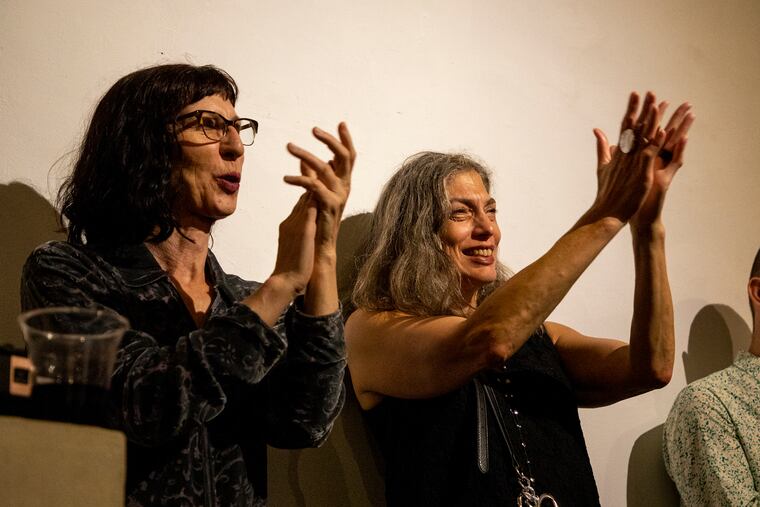Violinist Lara St. John’s friends and supporters rally for her in a New York concert
St. John delivered an 11-minute digest of the roughly 400 emails she has received since coming forward in July to tell the Inquirer that she was sexually abused by teacher Jascha Brodsky when she studied at Philadelphia's elite Curtis Institute of Music.

NEW YORK — Raised fists and even more raised camera phones greeted violinist Lara St. John at an informal Friday concert here titled “We Believe You: Solidarity Concert for Lara.”
Ten musicians of all stripes — from a classical alto flutist to an electronic music composer to those playing ancient folk instruments — crammed along with listeners into Gallery MC on West 52nd Street for a succession of tributes and musical selections for the 48-year-old violinist, who told The Inquirer in an article published in July that she had been sexually abused as a 14-year-old student at Philadelphia’s Curtis Institute of Music.
Yet any sense of victory at the solidarity concert was significantly muted by the tough realities that came to light about St. John’s alleged abuse in the mid-1980s by longtime Curtis professor Jascha Brodsky, which she said eventually culminated in her rape. She was then ignored by a Curtis administrator when she reported the abuse, she said.
The school’s immediate response to the article was to tell students, parents, alumni, and others to refrain from discussing the matter publicly, online, or on social media. It has since made some nonspecific public apologies and set up a hotline for reporting abuse, but has not announced an investigation into St. John’s allegations.
With devastating restraint, St. John delivered an 11-minute digest of the 400 or so emails she has received since going public. “I don’t know if I can get through this,” she said at the beginning.
And then she started with the accounts, one after another, of women from the classical music community who alleged they had been sexually abused.
“I had no idea,” said St. John. Their names, like all others on her list, were withheld. However, the alleged abusers were not: violinist William Preucil and conductor Charles Dutoit, both of whom have already faced accusations.
What nearly reduced St. John to tears was an account of a girl who said she was abused starting from age 8, and despite receiving trauma therapy ultimately committed suicide — an impulse that St. John had near the end of her Curtis years.
Also, the Juilliard School in New York was mentioned, which came as a huge surprise, both to flutist Emily Duncan, a 2018 graduate who performed, and John Corigliano, a Pulitzer Prize-winning composer and longtime faculty member who was in the audience.
“I knew some time ago about what happened to Lara. And she’s still suffering from it. She has a lot of guts,” he said.
The concert was organized by longtime St. John friend Milica Paranosic, a partner in the MC Gallery, with performers who volunteered as a result of Facebook postings and other notifications on social media.
Cellist Kristina Reiko Cooper played the intense “Lamentatio” by Giovanni Sollima.
Poet Erik Johnson and pianist Gene Pritsker created a piece for the occasion titled “We Have” that had the poet chanting over a musical accompaniment: “We will command. This is our day. … The power source that you dare claim turns our world and floods your veins.…”
Clearly St. John has built up a great amount of goodwill in the New York music community — in an evening that was distinctly Manhattan, with much loquacious philosophy about how artists tend to be set apart from society, as well as highly exotic sounds, such as that produced by a 15th-century Serbian gusle (a string instrument that is played with a bow) that was played by Paranosic.
For Corigliano, St. John rescued his violin piece titled “Stomp,” which had been written to be played for the Tchaikovsky Competition.
When conductor Valery Gergiev deemed it unplayable, St. John proved it was quite playable in a video that she made and was sent to Russia. The piece was subsequently dedicated to her.
“She’s the warmest person you could ever meet,” Corigliano said.
When asked if her experience going public had been worth it — with reliving the trauma and fielding the inevitable troll emails — she hesitated, then said: “I think so.”